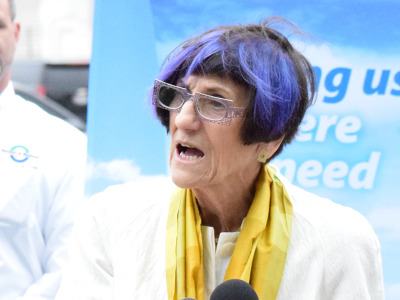The African scientist who led the UN Food Systems Summit process says the Sri Lankan government made a “reckless and careless” decision to ban the use of synthetic fertilizers, and she doesn’t think African nations will follow suit.
Agnes Kalibata conceded that the 2021 summit, which was designed to get nations to commit to addressing a wide range of sustainability challenges, including climate change, did not yield the results she had hoped. The coronavirus pandemic and Russia's war in Ukraine have both slowed down progress, she said.
But she said, “we shifted the paradigm on how people think about food” and educated the public on the connection between food production and health and environmental issues.
The 2021 Sri Lankan fertilizer ban was subsequently rolled back, but it still devastated crop yields, contributing to the island nation’s worst economic crisis since its founding in 1948.
“There’s enough scientific evidence to show that without using fertilizers, yields are reduced anywhere between 25% to 40%,” said Kalibata, who is president of the Alliance for a Green Revolution in Africa, an organization that promotes the use of agricultural technology on the continent.
 House Appropriations Committee Chair Rosa DeLauro, D-Conn.
House Appropriations Committee Chair Rosa DeLauro, D-Conn.
Kalibata, who served as the UN special envoy to the Food Systems Summit, talked to Agri-Pulse while in Washington recently for meetings with officials from the Agriculture Department, U.S. Agency for International Development and the World Bank, and with House Appropriations Committee Chairwoman Rosa DeLauro, D-Conn.
Don’t miss a beat! It’s easy to sign up for a FREE month of Agri-Pulse news! For the latest on what’s happening in Washington, D.C. and around the country in agriculture, just click here.
Kalibata said African countries still support the goals of the Green Revolution, including the “ability to produce enough food to feed people, but also to use food as a means of economic empowerment of people.”
The original Green Revolution was an effort to increase crop yields in the 1950s and 1960s that vastly increased the supply of food in India and other poor countries. Critics say the Green Revolution led to environmental damage from the overuse of synthetic fertilizer and chemicals. Similarly, the choice of Kalibata for the UN post was faulted in some quarters because of her support for technology.
Kalibata, who has a doctorate in entomology from the University of Massachusetts and served as Rwanda’s agriculture minister from 2008 to 2014, said the underuse of fertilizer in Africa also is contributing to environmental damage by forcing farms to convert virgin areas into cropland.
“I don't think that people aspire to go there (deep cuts in fertilizer usage). The only reason that they would go there is if fertilizers continue to be expensive,” she said.
Kalibata said “the implementation of the outcomes of the Food System Summit could have been better. We could have seen more momentum. I still think we will see a lot of momentum. But it's going to take some time in Africa.”
Seven African countries have submitted “pathways,” or routes for reaching sustainability goals, she said. A few of those countries are “translating those pathways into strategies that can be implemented at the country level. This is going to happen across the world, mostly because there's no other choice,” she said.
The Food Systems Summit was initially met with alarm by U.S. industry groups, who feared the European Union would use the process to convince poorer countries to reject agricultural technology.
But industry groups ultimately welcomed a new international “productivity” coalition that the Biden administration put together. The administration committed $10 billion over five years toward domestic and international food security.
For more news, go to Agri-Pulse.com.


